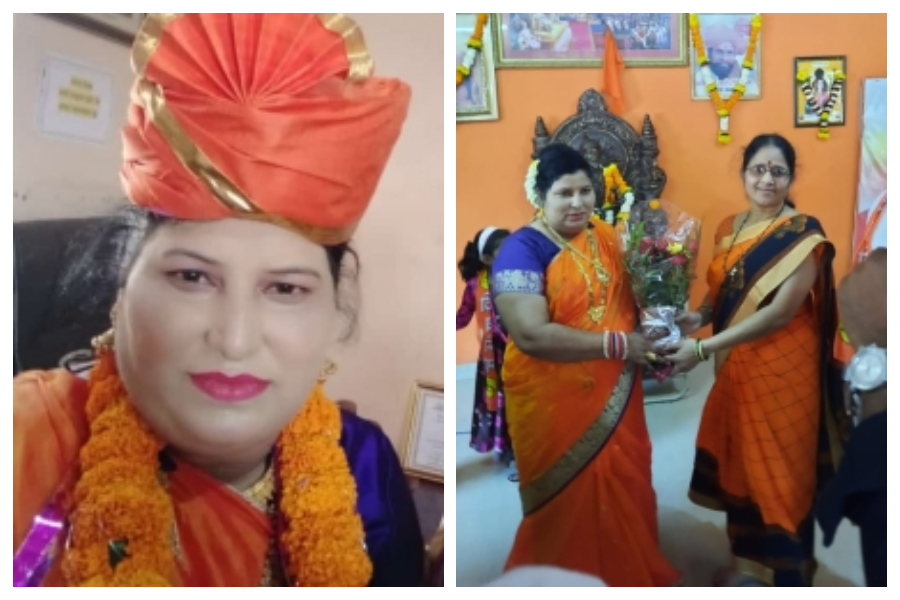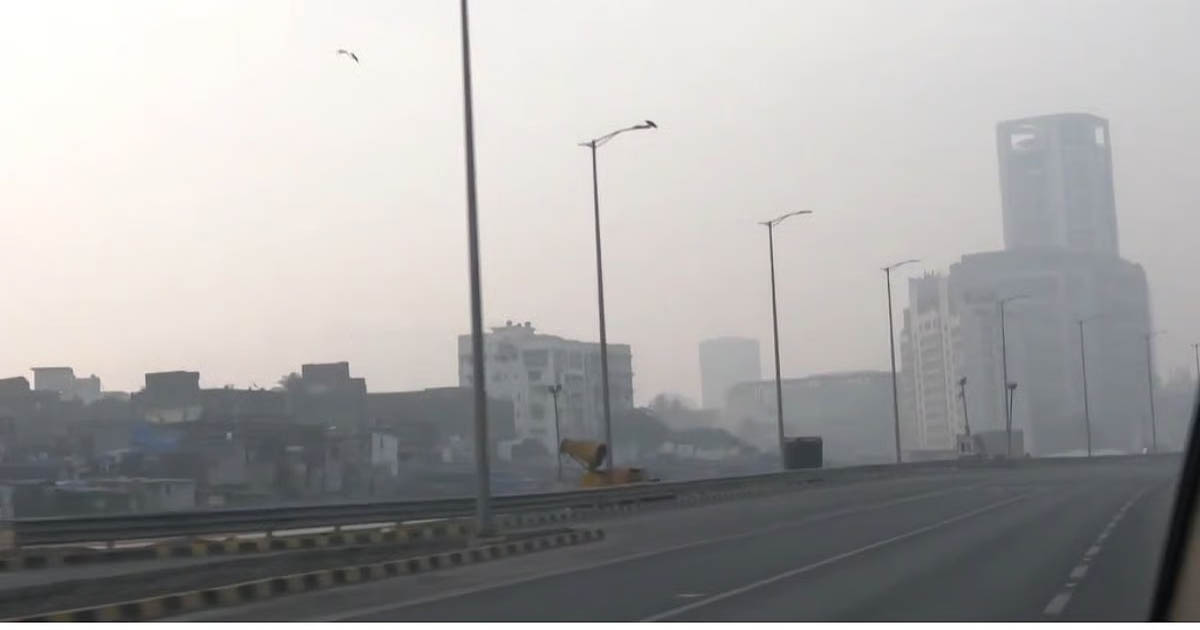National News
Row of saffron hijabs herald Shiv Sena’s ‘maiden’ Muslim Sarpanch

The sleepy Apta village erupted into celebrations when a demure, house-wife-turned politician Nazneen K. Patel, was unanimously elected the Sarpanch on Thursday.
She has created history of sorts — becoming the first ever Muslim woman Sarpanch of Shiv Sena in the state, and a first for the party in the past six decades since the Apta Village Panchayat came into being where the Peasants & Workers Party enjoyed unbroken control of its bastion.
The village had elected 11 members, including two from the Opposition Bharatiya Janata Party, in the 2021 Panchayat polls, swept by the Maha Vikas Aghadi, with Patel now getting the top post — reserved for women — in rotation from the PWP’s outgoing Sarpanch, Nikita D. Bhoir.
Scores of Muslim women Sainiks, sporting dazzling saffron-black ‘hijabs’ turned out to celebrate Patel’s election, who accepted and acknowledged their greetings and wishes, distributed sweets and goodness all around.
Taking charge on Friday, Patel said that her entire focus would be on developmental issues for which the entire village — with a population of around 10,000 comprising a mix of tribals, Marathas, Kolis, Brahmins, Muslims, etc., — has wholeheartedly supported the MVA.
“There are 14 tribal hamlets (wadis) which require several amenities, aanganwadis to be improved, maternity hospital where services have to be strengthened, and improving the conditions of several roads in and around Apta,” Patel told IANS.
Apta is a coastal village nestling on the banks of the Patalganga River where the PWP has held sway for past six decades, but now it has come under Shiv Sena’s control, said her husband, Khalil Patel.
Nazneen Patel’s elevation has charged the MVA allies — Sena-Nationalist Congress Party-Congress — symbolising a whiff of fresh air in the toxicity of the so-called ‘hijab row’ affecting different parts of India.
Sena’s farmer face and MoS Kishore Tiwari said Patel’s election shows the “benign face of Shiv Sena under the leadership of Chief Minister Uddhav Thackeray” despite attempts by the Opposition to portray it otherwise.
“No matter how vitiated the religious scenario in the country, in Apta there is complete communal camaraderie, and it is with the full support of the three allies this ‘change’ was possible,” Panvel Congress Working President Abhijit Patil said.
Eminent lawyer and NCP former MP Majeed Memon said while the BJP is busy in toppling the MVA, the three parties are making “perceptible changes” at all levels in the polity with long-term implications.
“The BJP is unable to digest all the good work done by MVA and is hounding us with misuse of Central probe agencies, the Governor’s post and other forms of harassment… But developments like Apta village prove that the MVA is on the right track,” Memon asserted.
The Patel couple said with pride that Apta is an example of “how India lives harmoniously in the villages,” untouched by the communal monsters unleashed in many areas.
“We all celebrate Ganeshotsav, Eid, Diwali and other festivals of all religions joyfully together… Nobody talks of religious politics… The masses are only concerned with developmental issues,” smiled Nazneen Patel, with her 19-year old daughter Rukhsar and 16-year-old son Saad standing beside.
Crime
Four held for IDFC First Bank fraud; amount transferred to private firm

Chandigarh, Feb 25: Haryana Director General of Anti-Corruption Bureau, Arshinder Singh Chawla, on Wednesday said four accused were arrested in the IDFC First Bank fraud case involving government departments as the money was transferred to the Swastik Desh project, a private firm owned by some of the accused.
They have been identified as Ribhav Rishi, Abhishek Singla, Abhay Kumar and Swati Singla.
“A letter was received on February 23 regarding embezzlement of Panchayat Department funds, and a case was registered following government orders,” he told the media in Panchkula, in Haryana.
He said the Special Investigating Team (SIT), headed by Ganga Ram Poonia, arrested the accused within 24 hours.
“IDFC Bank has returned the government funds, but the matter is being investigated,” Chawla said, adding Vibhav Rishi and Abhay had masterminded this entire case.
He said the money of the people of Haryana is safe.
“A sum of Rs 300 crore was invested in a private company and money also went to AU Small Finance.”
The money was sent to the Swastik Desh project, owned by Swati Singla, and her brother Abhishek Singla, and who have been arrested as part of the ongoing investigation.
Regarding the involvement of senior government officials in the fraud, Chawla said, “It is not possible to comment at this early stage of the investigation.”
The Vigilance and Anti-Corruption Bureau found that several government departments are involved in this matter, including some accounts of the Chandigarh administration.
As per information, the main accused Ribhav Rishi, resident of Panchkula, had left his job in the bank six months ago, while Abhay Kumar had quit his job in August last year.
In a strong assertion of fiscal accountability and administrative transparency, Chief Minister Nayab Singh Saini on Tuesday informed the Assembly that the government has recovered the Rs 556 crore linked to the fraud case, including nearly Rs 22 crore in interest, within 24 hours.
Chief Minister Saini said the full amount pertaining to various government departments, boards and corporations has been credited back by IDFC First Bank into the respective departmental accounts.
He said the swift recovery was made possible through coordinated efforts between the Haryana government and senior bank officials.
Calling it a matter of public trust, Chief Minister Saini underscored that the funds represent the hard-earned money of 2.8 crore citizens of Haryana and would be utilised strictly for their welfare.
“Every single rupee belonging to the people will be safeguarded and spent only for their benefit,” he said.
The Chief Minister said a high-level committee, headed by the Finance Secretary, has been constituted to examine the matter in detail and fix accountability of the employees and officers concerned.
The committee will determine responsibility and recommend further action, if required.
Chief Minister Saini said the bank has indicated that the irregularities were primarily linked to its Chandigarh branch and involved alleged collusion at the middle and lower levels. He made it clear that no one involved in this case, whether a government official or a bank employee, will be spared.
Crime
Odisha: Rs 4 crore seized from senior mines official’s residence

Bhubaneswar, Feb 25: In the highest-ever cash seizure by Odisha’s Vigilance Department, the anti corruption sleuths on Wednesday unearthed over Rs 4 crore in cash from the Bhubaneswar flat of Deputy Director of Mines, Cuttack Circle.
The accused, identified as Debabrata Mohanty, was apprehended on Tuesday night for allegedly accepting a bribe of Rs 30,000 from a licensed coal vendor for allowing smooth running of his coal depot and to grant permission to transport coal.
Following his arrest, Vigilance officials launched simultaneous searches at multiple locations linked to him, including his residential flat at Shree Vihar, Patia in Bhubaneswar, his parental house at Mathasahi in Bhadrak, and his office chamber in Cuttack to ascertain whether the accused Deputy Director has possessed any disproportionate assets (DA).
During the ongoing searches, cash exceeding Rs 4 crore was recovered from his flat in Bhubaneswar. The money was found concealed in trolley bags and almirahs.
Officials said the counting process is underway to determine the exact amount.
The recovery marks the largest cash seizure ever made by Odisha Vigilance.
Additionally, Rs 1.20 lakh in cash was recovered and seized from Mohanty’s office drawer and personal possession.
Apart from the cash, Vigilance officials have so far unearthed the following assets: A palatial double-storeyed building measuring approximately 2,400 sq ft at Pahala in Bhubaneswar. Gold ornaments weighing around 130 grams have also been recovered from Mohanty’s posession.
A case has been registered under Section 7 of the Prevention of Corruption (Amendment) Act, 2018, against Mohanty at the Bhubaneswar Vigilance Police Station in this regard on Monday.
Notably, Chief Minister Mohan Charan Majhi, on Monday, told the State Assembly that the Vigilance Department has registered a total 416 cases against government officers and employees in the state for taking bribes, committing financial irregularities in government fund and possession of disproportionate assets between January 1, 2024 and December 31, 2025.
National News
Mumbai Weather Update February 24, 2026: Smog Engulfs The City Skyline As AQI Remains In ‘Unhealthy’ Category

Mumbai: The residents of Mumbai woke up to a warm sunny morning on Tuesday, 24th February. But the pleasant weather did not last long as smog covered the sky in most parts of the city, posing an issue to early morning commuters.
According to the India Meteorological Department (IMD), Mumbai is expected to experience mainly clear skies today, with temperatures likely to range between 19°C and 34°C, the same as the previous day, indicating the arrival of the summer months.
The city’s overall Air Quality Index (AQI) stood at 235 on Tuesday, placing it into the ‘unhealthy’ category, as per data from AQI.in. In the last 24 hours, there have been major fluctuations in the AQI, with the lowest recorded AQI of 164 at 1.30 pm the previous day. The AQI has only increased ever since. The sudden spike in pollution levels is concerning, as such fluctuations can have adverse effects on vulnerable groups, including children, senior citizens, and those with respiratory ailments.
Several pockets in Mumbai continue to report severe air quality. Kannamwar Nagar Li recorded the highest AQI at 357, placing it in the ‘Severe’ category. Other areas with critically high readings included BS Ambedkar Nagar, Mithchowki, Sarvodaya Nagar, Savitribai Phule Nagar, which recorded AQI levels of 346, 345, 325 and 324, respectively, falling into the ‘severe’ category.
In contrast, a few localities reported relatively better air quality. Gamdevi Station 1 recorded an AQI of 67, falling in the ‘Moderate’ category. Hira Nagar, New Navy Nagar, Saraswati Colony and Walkeshwar reported AQI levels of 97 (Moderate), 98 (Moderate), 100 (Moderate) and 103 (Poor), respectively.
As per standard air quality classifications, AQI values between 0 and 50 are considered ‘good’, 51 to 100 ‘moderate’, 101 to 200 ‘poor’, 201 to 300 ‘unhealthy’ and levels above 300 are classified as ‘severe’ or ‘hazardous’.
-

 Crime4 years ago
Crime4 years agoClass 10 student jumps to death in Jaipur
-

 Maharashtra1 year ago
Maharashtra1 year agoMumbai Local Train Update: Central Railway’s New Timetable Comes Into Effect; Check Full List Of Revised Timings & Stations
-

 Maharashtra1 year ago
Maharashtra1 year agoMumbai To Go Toll-Free Tonight! Maharashtra Govt Announces Complete Toll Waiver For Light Motor Vehicles At All 5 Entry Points Of City
-

 Maharashtra1 year ago
Maharashtra1 year agoFalse photo of Imtiaz Jaleel’s rally, exposing the fooling conspiracy
-

 National News1 year ago
National News1 year agoMinistry of Railways rolls out Special Drive 4.0 with focus on digitisation, cleanliness, inclusiveness and grievance redressal
-

 Maharashtra1 year ago
Maharashtra1 year agoMaharashtra Elections 2024: Mumbai Metro & BEST Services Extended Till Midnight On Voting Day
-

 National News1 year ago
National News1 year agoJ&K: 4 Jawans Killed, 28 Injured After Bus Carrying BSF Personnel For Poll Duty Falls Into Gorge In Budgam; Terrifying Visuals Surface
-

 Crime1 year ago
Crime1 year agoBaba Siddique Murder: Mumbai Police Unable To Get Lawrence Bishnoi Custody Due To Home Ministry Order, Says Report
















